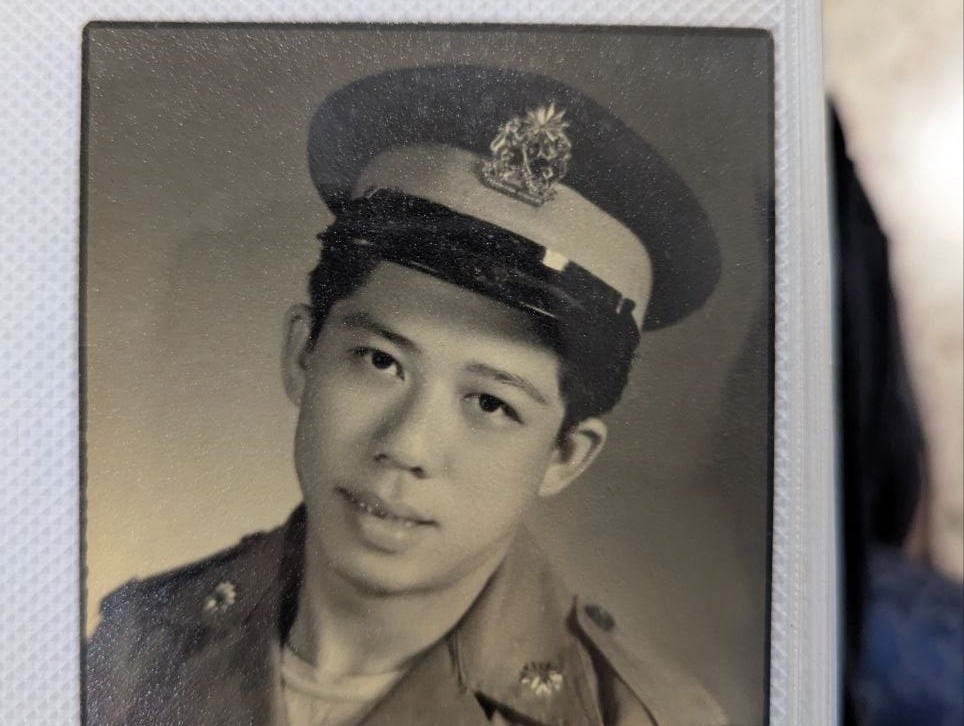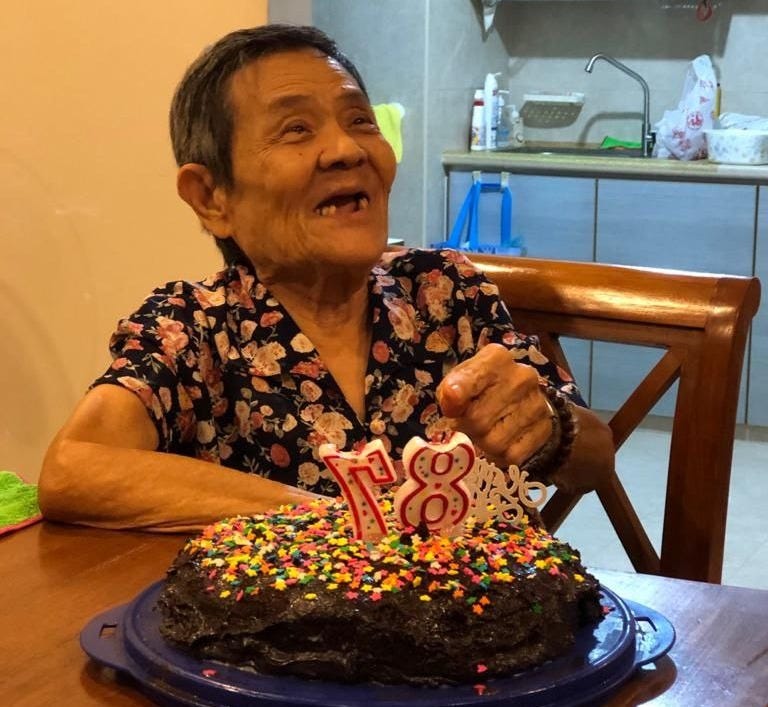Minolta says goodbye
There was a stillness in the air as my family, 14 strong, watched the coffin crawl toward the furnace. Grandma’s death was the end of a chapter in my life — years of visiting her at home and in the hospital, of orbiting her during family gatherings, as Asian households do.
Still, I never knew Grandma well. As the forklift pushed her further into the distance, my cousins and I stood silent. Two of my aunts called out well-wishes, as dictated by Chinese tradition, while my other aunt wept and my uncle gripped the handlebars before him.
At the far end of the viewing room, my Mum gazed through the glass, with no words and no tears, as mechanized wheels took her mother away.
When she was a girl, Mum’s relatives nicknamed her Minolta, on account of how she blinked all the time like the shutter of an analog camera. She was the fourth child of a lorry transport honcho who plied Singapore’s docks in the 60’s and 70’s.
Mild and trusting in her childhood, Mum was dubbed “Ah Moh” by her family, an endearing Hokkien slang term that meant she was slow or “blur.”
You can see her in this old family photo: the little girl standing in front of her father.
“Because they called me Minolta,” she remembered of the photo. “So I told myself I had to open my eyes wide this time.”
Little Minolta seemed a far cry from the woman I know now: the accountant-by-training who packed up her family and moved to China for a decade and then back, started two companies, married a rascal in my father, and mastered two professional fields.
As a child, Mum was often the most vulnerable among her siblings. She recalled being lost and confused as a girl, uncertain of the drama and chaos in her family, but feeling it all the same. Her younger sister would hit her and stab her with lead pencils, and when Mum cried, Grandma would rush out and beat both of them.
My grandmother was a complex woman. When Mum invited her over for dinner a few years ago, Grandma proclaimed of my brother and me: “Your children are so obedient!”
For a moment, Mum felt a tinge of pride. But Grandma soon followed with: “Your cooking is so horrible, yet they are still eating!”
We still laugh about that comment today. Ultimately, I think my Grandma was a kind and compassionate woman, just ruled by trauma.
She was six or seven when the Second World War steamrolled into Singapore, and she saw firsthand the horrors of the Japanese occupation. Grandma was unwanted by her family — as many girls were back then — and subject to abusive parents. Her husband, a fighting hero in his own massive family of 10 siblings, was successful in his business, and fell often to the trappings of successful men.

There are days I wonder with sadness what could have been, had Grandma been brought up with love. When I hear stories of her childhood, I wished I could travel back in time to save her. But trauma does not justify behavior.
“How stupid!” she would say of my Mum whenever we visited, even when we arrived with her favorite foods.
Grandma’s ferocity stretches back decades. She constantly squabbled with wet market folk, and picked fights with the neighbors. At her funeral, a distant uncle told me that my grandmother had a tiff with a relative. She wore clogs to his wedding in disrespect — and made her kids wear them too.
One day, fed up with her husband, she left her children at home for close to a year.
This was Little Minolta’s world, governed by the constant threat of explosive emotion, outbursts of violence, of betrayal and words that pierce the heart. And with every harsh parent comes a child obsessed with being “good enough.”
“I wanted her approval,” Mum told me as we walked on a chilly night in the neighborhood park near my Grandma’s flat. “For so many years.”
In her youth, Mum studied hard, saved her pocket money to attend university, reserved her salaries with discipline, and followed my Grandma staunchly in Buddhism.
It worked for a time, although she lost her Golden Girl status before I was born. She’d become a Christian, and in Grandma’s Buddhist mind, that gulf could not be reconciled.
Teenage me watched regularly as they quarreled about our faith. It was all in Hokkien, so I understood nothing that was said — though I could tell from the tears in Mum’s eyes that Grandma, with every syllable, knew how to drive daggers into her.
As a Christian, Mum did all she could to save her mother. But she resigned from that battle some years ago. The toll on her was too much.
“She just doesn’t want it,” Mum told me. Grandma chose to reject our faith.
Mum tried to mentally distance herself from her upbringing. To her credit, the hurts of her childhood seemed foreign to me. Whatever my Mum endured, she did not pass on. She had broken the cycle.
There are times when the fighting spirit of her mother would lash out, seizing upon small words or perceived slights. As boys, my brother and I would often joke of “Mount Mum,” classified as an overly active volcano.
Some days, despite decades of sharpening herself with grit and experience, she became that little girl reacting to us just like how Grandma reacted to her.
Above all, when it came to dealing with her mother, Mum would often revert back to the habits of the past.
“I can detach myself logically,” she told me. “But emotionally, it’s not so easy.”
I would find her drained and quiet at home, holding her phone and wondering what to say, what to do, when confronting the tigress that was her mother. Harsher words have been uttered by other elderly ladies, but Grandma’s cut deep into old wounds. So long as Grandma was alive, a part of Mum would always be that girl stung so easily by the tongue.
Of course, they had happy moments. Ice-cream on a sunny afternoon. A day out after Mum scored well on her exams. She would crawl into Grandma’s bed in their cramped flat as a little girl, feeling safe next to her mother.
One memory remains in Mum’s mind. Youthful and hale, Grandma was sunning blankets, and Little Minolta pressed her face into them afterward, marveling at their smell.
Grandma said to her: “The sun’s warmth is like mama’s warmth.”
For all the anger and hurt between them, they still had that special, tender bond. You only have one mother on this Earth.
Yann Martel writes in his bestselling book, The Life of Pi: “To lose your father is to lose the one whose guidance and help you seek, who supports you like a tree trunk supports its branches. To lose your mother, well, that is like losing the sun above you.”
On the fifth day of my Grandma’s wake, her children approached the coffin. My aunts dutifully recited Buddhist prayers. Head toward the light, they said. Exhausted, my other relatives said their final words.
Mum lingered when it was her turn, looking over her mother’s face.
“Thank you,” she whispered.
We boarded the bus, and they performed the last rites at Mandai in rushed procession. Other bodies had to to be burned, other families needed to grieve.
Through the grand window, we saw the coffin rumble forward.
Her siblings cried out and shook with tears. Mum just waved farewell, sadness laden on her face.
My mother had forged herself into a woman of merit. Far and wide, people call her Teacher. But in that moment, I saw that little girl, waving to a parent for the last time. She knows they will never see each other again.
Grandma reached the end of the track, the beeping, unthinking forklift pushing her past the metal doors. Slowly, she slipped by the exit, and faded from view.
Mum mouthed a single word: “Goodbye.”
Goodbye, Mama. Goodbye, Minolta.








